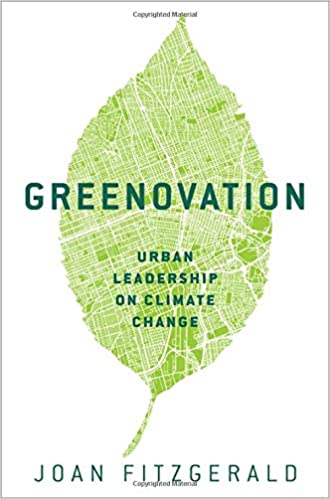We recently checked in with Prof. Joan Fitzgerald to discuss her fourth book, titled "Greenovation: Urban Leadership on Climate Change." She outlines how her research and interests have led to this new work and offers advice on how to keep persevering toward progress.
Describe how your career and research has led to Greenovation.
I have been involved with environmental organizations since high school, but this interest wasn’t addressed in my research until my 2003 book, Economic Revitalization: Strategies and Cases for City and Suburb (Sage). My co-author and I asked how economic development practice would differ in sustainability and equity were the top concerns.
But my follow-up book focused more on equity. Moving Up in the New Economy (Cornell Univ. Press), examined how low-income workers could advance through career ladders in different sectors. I was then ready to focus more on sustainability.
So, in Emerald Cities: Linking Sustainability and Economic Development (Oxford Univ. Press), my frame of analysis was sustainability and addressing climate change while advancing a more equitable city and creating economic opportunity—kind of flipping the frame of Economic Revitalization.
Greenovation (Oxford Univ. Press) has more of a sense of urgency. I argue that cities aren’t doing as much as they should or could be doing on climate change and go so far to define most urban action as random acts of greenness. It’s a call to go beyond the low-hanging fruit and offers examples of leadership in European and North American Cities and strategies for getting there. And of course, doing so in a way to create a more equitable city with more economic opportunity in the green economy.
Perseverance in the face of adversity is how we sustain progress.
What does progress look like tangibly? Is there a pinnacle?
Progress can be seen in policy and in where we invest our resources. Cities committing to being carbon neutral or 100% renewable by 2050 with a detailed plan for getting there with interim goals and accountability for what happens if they don’t. But cities can’t do it alone, so the same kind of policies are needed at the state level. The pinnacle? A federal commitment to becoming 100% renewable by 2050 and an accompanying investment in a green new deal that will create jobs and opportunity in producing green technologies domestically. And paying attention that those left behind in our current economy are given first opportunity in the green economy.
How do we sustain progress?
By never taking our eyes off the prize. A lot of people have been quoting Martin Luther King lately, “The arc of the moral universe is long, but it bends toward justice.” Same for the climate justice universe. It’s a political struggle—whether it’s the blue (or green) city in a red state fighting against preemption, environmentalists staying the course while Trump dismantles decades of environmental policy, or Black Lives Matter hitting the streets and finally gaining traction after George Floyd’s murder. Perseverance in the face of adversity is how we sustain progress.
The central topic of your book is mostly geared toward cities/urban settings. What about individuals? What are some steps/habits/actions they can pursue to continue to climate justice?
It’s great to lead by example—using public transit or biking instead of driving, retrofitting your house for energy efficiency, recycling, and the like. But too often that leads to a “greener than thou” mentality that isn’t productive. A climate justice activist I admire is Mary Annaise Hegler, who wrote a piece last year with an important message: “I work in the environmental movement. I don’t care if you recycle. Stop obsessing over your environmental “sins.” Fight the oil and gas industry instead.”
Don’t get me wrong—I support recycling! But the most impactful thing individuals can do is be a voice for political and policy change. At every level of government, we need to push for carbon neutrality by 2050, a complete transition to renewable energy, and the federal and state investments to make it happen. As individuals we need to fight for a climate just future with racial equity at the forefront. Many cities are leading the way—Providence, Portland, Oregon, Oakland and a few others. Individuals can pressure their mayors and city councils to follow their lead. It all counts.
What gives you hope for the future?
My grandchildren. All the activists fighting against voter suppression and for climate justice and getting out the vote. Black Lives Matter. 350.org. Joe Biden’s apparent lead over Trump.

Greenovation: Urban Leadership on Climate Change was published earlier this year and is available for purchase from Amazon.




